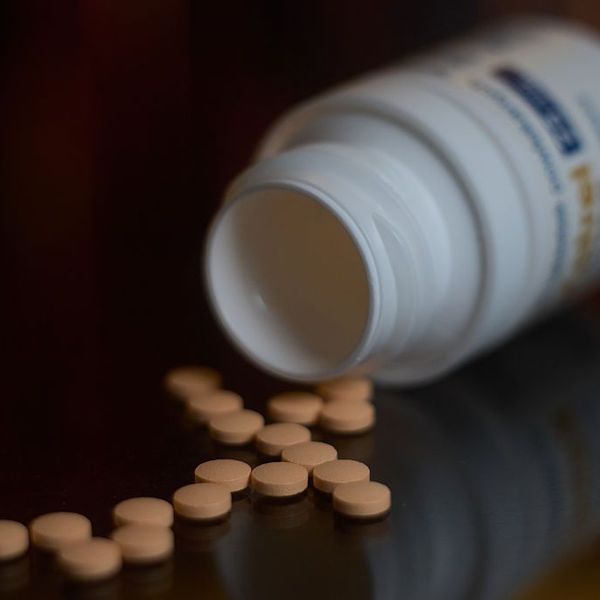As Prices 'Skyrocket,' 20 States Sue Drug Companies for Collusion, Conspiracy
'We have evidence of widespread participation in illegal conspiracies across the generic drug industry,' says Connecticut attorney general
Twenty state attorneys general filed a lawsuit on Thursday against several pharmaceutical companies, accusing them of entering into "numerous illegal conspiracies" to fix generic drug prices at consumers' expense.
The federal lawsuit (pdf) names generic drug-makers Heritage Pharmaceuticals, Inc., Aurobindo Pharma USA, Inc., Citron Pharma, LLC, Mayne Pharma (USA), Inc., Mylan Pharmaceuticals, Inc., and Teva Pharmaceuticals USA, Inc., and concerns two drugs: doxycycline hyclate delayed release, an antibiotic used to treat a range of conditions including respiratory tract infections, and glyburide, an oral diabetes medication.
It was filed in the U.S. District Court for the District of Connecticut and labels Heritage as the "principal architect and ringleader" that helped organize a "wide-ranging series of conspiracies" to fix prices.
"The misconduct was conceived and carried out by senior drug company executives and their subordinate marketing and sales executives."
George Jepsen, Connecticut Attorney General
"My office has dedicated significant resources to this investigation for more than two years and has developed compelling evidence of collusion and anticompetitive conduct across many companies that manufacture and market generic drugs in the United States," said Connecticut Attorney General George Jepsen, who is leading the coalition.
The other plaintiff states are Delaware, Florida, Hawaii, Idaho, Iowa, Kansas, Kentucky, Louisiana, Maine, Maryland, Massachusetts, Minnesota, Nevada, New York, North Dakota, Ohio, Pennsylvania, Virginia, and Washington.
"While the principal architect of the conspiracies addressed in this lawsuit was Heritage Pharmaceuticals, we have evidence of widespread participation in illegal conspiracies across the generic drug industry," Jepsen said. "Ultimately, it was consumers--and, indeed, our healthcare system as a whole--who paid for these actions through artificially high prices for generic drugs."
A release from Jepsen's office says "the misconduct was conceived and carried out by senior drug company executives and their subordinate marketing and sales executives," who "coordinated their schemes through direct interaction with their competitors at industry trade shows, customer conferences, and other events, as well as through direct email, phone, and text message communications."
For example, Reuters reports:
"While generic competition is supposed to bring prices down, these companies secretly agreed to rig the system to drive prices up at the expense of patients," Minnesota Attorney General Lori Swanson said in a statement.
She said a salesperson for Heritage in Minnesota played a key role in the scheme by organizing dinners among employees of competing drug companies when they visited the state.
"The dinners and meetings led to the exchange of information about the competitors' business plans and ultimately led to agreements on setting prices and/or allocating the market so as to avoid competing on price," a statement from Swanson's office said.
The news comes just one day after it was revealed that the U.S. Department of Justice has charged two former Heritage executives with conspiring to fix generic prices--"the first fruits of an ongoing and sweeping investigation into generic drug price-fixing by the Department," according to Ars Technica.
As Bloomberg reported, guilty pleas and cooperation from the two executives "could lead to charges against executives at other drugmakers."
Forbes predicts "[t]he antitrust lawsuit and federal investigation will likely bring further political heat to the generic drug sector."
Indeed, the lawsuit charges: "Over the last several years, however, [the] price dynamic has changed for a large number of generic drugs. Prices for dozens of generic drugs have uncharacteristically risen--some have skyrocketed--for no apparent reason, sparking outrage from public officials, payers, and consumers across the country whose costs have doubled, tripled, or in some cases increased up to 1,000 percent or more."
An Urgent Message From Our Co-Founder
Dear Common Dreams reader, The U.S. is on a fast track to authoritarianism like nothing I've ever seen. Meanwhile, corporate news outlets are utterly capitulating to Trump, twisting their coverage to avoid drawing his ire while lining up to stuff cash in his pockets. That's why I believe that Common Dreams is doing the best and most consequential reporting that we've ever done. Our small but mighty team is a progressive reporting powerhouse, covering the news every day that the corporate media never will. Our mission has always been simple: To inform. To inspire. And to ignite change for the common good. Now here's the key piece that I want all our readers to understand: None of this would be possible without your financial support. That's not just some fundraising cliche. It's the absolute and literal truth. We don't accept corporate advertising and never will. We don't have a paywall because we don't think people should be blocked from critical news based on their ability to pay. Everything we do is funded by the donations of readers like you. Will you donate now to help power the nonprofit, independent reporting of Common Dreams? Thank you for being a vital member of our community. Together, we can keep independent journalism alive when it’s needed most. - Craig Brown, Co-founder |
Twenty state attorneys general filed a lawsuit on Thursday against several pharmaceutical companies, accusing them of entering into "numerous illegal conspiracies" to fix generic drug prices at consumers' expense.
The federal lawsuit (pdf) names generic drug-makers Heritage Pharmaceuticals, Inc., Aurobindo Pharma USA, Inc., Citron Pharma, LLC, Mayne Pharma (USA), Inc., Mylan Pharmaceuticals, Inc., and Teva Pharmaceuticals USA, Inc., and concerns two drugs: doxycycline hyclate delayed release, an antibiotic used to treat a range of conditions including respiratory tract infections, and glyburide, an oral diabetes medication.
It was filed in the U.S. District Court for the District of Connecticut and labels Heritage as the "principal architect and ringleader" that helped organize a "wide-ranging series of conspiracies" to fix prices.
"The misconduct was conceived and carried out by senior drug company executives and their subordinate marketing and sales executives."
George Jepsen, Connecticut Attorney General
"My office has dedicated significant resources to this investigation for more than two years and has developed compelling evidence of collusion and anticompetitive conduct across many companies that manufacture and market generic drugs in the United States," said Connecticut Attorney General George Jepsen, who is leading the coalition.
The other plaintiff states are Delaware, Florida, Hawaii, Idaho, Iowa, Kansas, Kentucky, Louisiana, Maine, Maryland, Massachusetts, Minnesota, Nevada, New York, North Dakota, Ohio, Pennsylvania, Virginia, and Washington.
"While the principal architect of the conspiracies addressed in this lawsuit was Heritage Pharmaceuticals, we have evidence of widespread participation in illegal conspiracies across the generic drug industry," Jepsen said. "Ultimately, it was consumers--and, indeed, our healthcare system as a whole--who paid for these actions through artificially high prices for generic drugs."
A release from Jepsen's office says "the misconduct was conceived and carried out by senior drug company executives and their subordinate marketing and sales executives," who "coordinated their schemes through direct interaction with their competitors at industry trade shows, customer conferences, and other events, as well as through direct email, phone, and text message communications."
For example, Reuters reports:
"While generic competition is supposed to bring prices down, these companies secretly agreed to rig the system to drive prices up at the expense of patients," Minnesota Attorney General Lori Swanson said in a statement.
She said a salesperson for Heritage in Minnesota played a key role in the scheme by organizing dinners among employees of competing drug companies when they visited the state.
"The dinners and meetings led to the exchange of information about the competitors' business plans and ultimately led to agreements on setting prices and/or allocating the market so as to avoid competing on price," a statement from Swanson's office said.
The news comes just one day after it was revealed that the U.S. Department of Justice has charged two former Heritage executives with conspiring to fix generic prices--"the first fruits of an ongoing and sweeping investigation into generic drug price-fixing by the Department," according to Ars Technica.
As Bloomberg reported, guilty pleas and cooperation from the two executives "could lead to charges against executives at other drugmakers."
Forbes predicts "[t]he antitrust lawsuit and federal investigation will likely bring further political heat to the generic drug sector."
Indeed, the lawsuit charges: "Over the last several years, however, [the] price dynamic has changed for a large number of generic drugs. Prices for dozens of generic drugs have uncharacteristically risen--some have skyrocketed--for no apparent reason, sparking outrage from public officials, payers, and consumers across the country whose costs have doubled, tripled, or in some cases increased up to 1,000 percent or more."
Twenty state attorneys general filed a lawsuit on Thursday against several pharmaceutical companies, accusing them of entering into "numerous illegal conspiracies" to fix generic drug prices at consumers' expense.
The federal lawsuit (pdf) names generic drug-makers Heritage Pharmaceuticals, Inc., Aurobindo Pharma USA, Inc., Citron Pharma, LLC, Mayne Pharma (USA), Inc., Mylan Pharmaceuticals, Inc., and Teva Pharmaceuticals USA, Inc., and concerns two drugs: doxycycline hyclate delayed release, an antibiotic used to treat a range of conditions including respiratory tract infections, and glyburide, an oral diabetes medication.
It was filed in the U.S. District Court for the District of Connecticut and labels Heritage as the "principal architect and ringleader" that helped organize a "wide-ranging series of conspiracies" to fix prices.
"The misconduct was conceived and carried out by senior drug company executives and their subordinate marketing and sales executives."
George Jepsen, Connecticut Attorney General
"My office has dedicated significant resources to this investigation for more than two years and has developed compelling evidence of collusion and anticompetitive conduct across many companies that manufacture and market generic drugs in the United States," said Connecticut Attorney General George Jepsen, who is leading the coalition.
The other plaintiff states are Delaware, Florida, Hawaii, Idaho, Iowa, Kansas, Kentucky, Louisiana, Maine, Maryland, Massachusetts, Minnesota, Nevada, New York, North Dakota, Ohio, Pennsylvania, Virginia, and Washington.
"While the principal architect of the conspiracies addressed in this lawsuit was Heritage Pharmaceuticals, we have evidence of widespread participation in illegal conspiracies across the generic drug industry," Jepsen said. "Ultimately, it was consumers--and, indeed, our healthcare system as a whole--who paid for these actions through artificially high prices for generic drugs."
A release from Jepsen's office says "the misconduct was conceived and carried out by senior drug company executives and their subordinate marketing and sales executives," who "coordinated their schemes through direct interaction with their competitors at industry trade shows, customer conferences, and other events, as well as through direct email, phone, and text message communications."
For example, Reuters reports:
"While generic competition is supposed to bring prices down, these companies secretly agreed to rig the system to drive prices up at the expense of patients," Minnesota Attorney General Lori Swanson said in a statement.
She said a salesperson for Heritage in Minnesota played a key role in the scheme by organizing dinners among employees of competing drug companies when they visited the state.
"The dinners and meetings led to the exchange of information about the competitors' business plans and ultimately led to agreements on setting prices and/or allocating the market so as to avoid competing on price," a statement from Swanson's office said.
The news comes just one day after it was revealed that the U.S. Department of Justice has charged two former Heritage executives with conspiring to fix generic prices--"the first fruits of an ongoing and sweeping investigation into generic drug price-fixing by the Department," according to Ars Technica.
As Bloomberg reported, guilty pleas and cooperation from the two executives "could lead to charges against executives at other drugmakers."
Forbes predicts "[t]he antitrust lawsuit and federal investigation will likely bring further political heat to the generic drug sector."
Indeed, the lawsuit charges: "Over the last several years, however, [the] price dynamic has changed for a large number of generic drugs. Prices for dozens of generic drugs have uncharacteristically risen--some have skyrocketed--for no apparent reason, sparking outrage from public officials, payers, and consumers across the country whose costs have doubled, tripled, or in some cases increased up to 1,000 percent or more."

